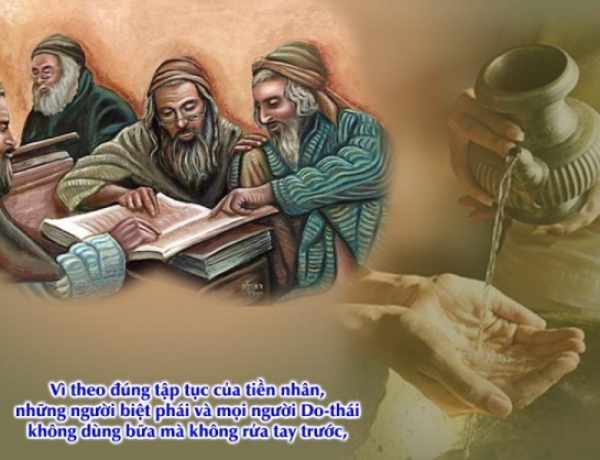Tin Mừng Chúa Giêsu Kitô theo Thánh Mat co 7, 1-8.14-15.21-23
Evangelium nach Markus 7,1-8.14-15.21-23
Gospel to Marco 7, 1-8.14-15.21-23
Có những người Pha-ri-sêu và một số kinh sư tụ họp quanh Đức Giê-su. Họ là những người từ Giê-ru-sa-lem đến.
Die Pharisäer und einige Schriftgelehrte, die aus Jerusalem gekommen waren, hielten sich bei Jesus auf.
And there came together to him the Pharisees and certain of the scribes who had come from Jerusalem,
Họ thấy vài môn đệ của Người dùng bữa mà tay còn ô uế, nghĩa là chưa rửa.
Sie sahen, dass einige seiner Jünger ihr Brot mit unreinen, das heißt mit ungewaschenen Händen aßen.
And had seen that some of his disciples took their bread with unclean, that is, unwashed, hands.
Thật vậy, người Pha-ri-sêu cũng như mọi người Do-thái đều nắm giữ truyền thống của tiền nhân: họ không ăn gì, khi chưa rửa tay cẩn thận;
Die Pharisäer essen nämlich wie alle Juden nur, wenn sie vorher mit einer Hand voll Wasser die Hände gewaschen haben, wie es die Überlieferung der Alten vorschreibt.
Now the Pharisees, and all the Jews, do not take food without washing their hands with care, keeping the old rule which has been handed down to them:
thức gì mua ngoài chợ về, cũng phải rảy nước đã rồi mới ăn; họ còn giữ nhiều tập tục khác nữa như rửa chén bát, bình lọ và các đồ đồng.
Auch wenn sie vom Markt kommen, essen sie nicht, ohne sich vorher zu waschen. Noch viele andere überlieferte Vorschriften halten sie ein, wie das Abspülen von Bechern, Krügen und Kesseln.
And when they come from the market-place, they take no food till their hands are washed; and a number of other orders there are, which have been handed down to them to keep--washings of cups and pots and brass vessels.
Vậy, người Pha-ri-sêu và kinh sư hỏi Đức Giê-su: “Sao các môn đệ của ông không theo truyền thống của tiền nhân, cứ để tay ô uế mà dùng bữa?”
Die Pharisäer und die Schriftgelehrten fragten ihn also: Warum halten sich deine Jünger nicht an die Überlieferung der Alten, sondern essen ihr Brot mit unreinen Händen?
And the Pharisees and the scribes put the question to him, Why do your disciples not keep the rules of the fathers, but take their bread with unwashed hands?
Người trả lời họ: “Ngôn sứ I-sai-a thật đã nói tiên tri rất đúng về các ông là những kẻ đạo đức giả, khi viết rằng: Dân này tôn kính Ta bằng môi bằng miệng,còn lòng chúng thì lại xa Ta.
Er antwortete ihnen: Der Prophet Jesaja hatte Recht mit dem, was er über euch Heuchler sagte: Dieses Volk ehrt mich mit den Lippen, / sein Herz aber ist weit weg von mir.
And he said, Well did Isaiah say of you, you false ones: These people give me honour with their lips, but their heart is far from me.
Chúng có thờ phượng Ta thì cũng vô ích,vì giáo lý chúng giảng dạy chỉ là giới luật phàm nhân.
Es ist sinnlos, wie sie mich verehren; / was sie lehren, sind Satzungen von Menschen.
But their worship is to no purpose, while they give as their teaching the rules of men.
Các ông gạt bỏ điều răn của Thiên Chúa, mà duy trì truyền thống của người phàm.”
Ihr gebt Gottes Gebot preis und haltet euch an die Überlieferung der Menschen.
For, turning away from the law of God, you keep the rules of men.
Sau đó, Đức Giê-su lại gọi đám đông tới mà bảo: “Xin mọi người nghe tôi nói đây, và hiểu cho rõ:
Dann rief er die Leute wieder zu sich und sagte: Hört mir alle zu und begreift, was ich sage:
And turning to the people again, he said to them, Give ear to me all of you, and let my words be clear to you:
Không có cái gì từ bên ngoài vào trong con người lại có thể làm cho con người ra ô uế được; nhưng chính cái từ con người xuất ra, là cái làm cho con người ra ô uế.
Nichts, was von außen in den Menschen hineinkommt, kann ihn unrein machen, sondern was aus dem Menschen herauskommt, das macht ihn unrein.
There is nothing outside the man which, going into him, is able to make him unclean: but the things which come out of the man are those which make the man unclean.
Vì từ bên trong, từ lòng người, phát xuất những ý định xấu: tà dâm, trộm cắp, giết người,
Denn von innen, aus dem Herzen der Menschen, kommen die bösen Gedanken, Unzucht, Diebstahl, Mord,
Because from inside, from the heart of men, come evil thoughts and unclean pleasures,
ngoại tình, tham lam, độc ác, xảo trá, trác táng, ganh tỵ, phỉ báng, kiêu ngạo, ngông cuồng.
Ehebruch, Habgier, Bosheit, Hinterlist, Ausschweifung, Neid, Verleumdung, Hochmut und Unvernunft.
The taking of goods and of life, broken faith between husband and wife, the desire of wealth, wrongdoing, deceit, sins of the flesh, an evil eye, angry words, pride, foolish acts:
Tất cả những điều xấu xa đó, đều từ bên trong xuất ra, và làm cho con người ra ô uế.”
All dieses Böse kommt von innen und macht den Menschen unrein.
All these evil things come from inside, and make the man unclean.
